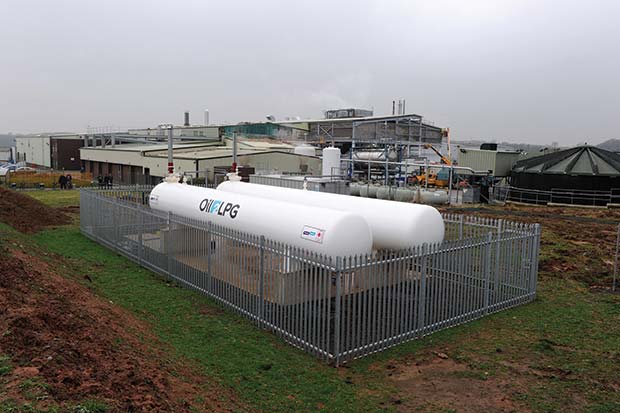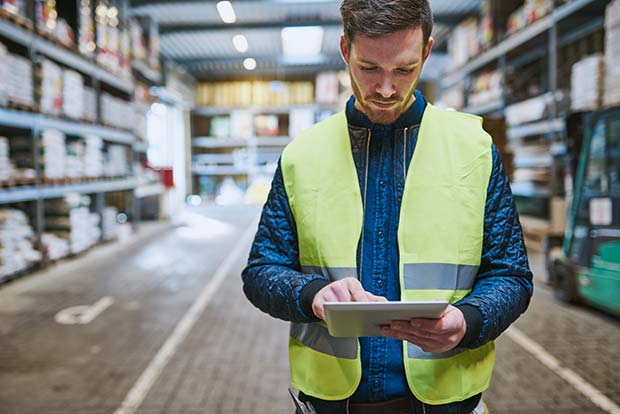Liquefied petroleum gas (LPG) is rapidly gaining recognition as a viable, cost-effective alternative to oil for off-grid industrial operations. Warehouse & Logistics News explores the advantages of LPG as a power source, including the environmental and business case for warehouses and logistics firms looking to switch – and its growing popularity as a forklift truck fuel.
 Running warehousing and logistics operations is an energyintensive business – and for those that aren’t connected to the mains gas grid, the costs and carbon emissions associated with some offgrid fuels can be eye-opening. Oil is a case in point: although it is arguably the off-grid fuel that people are most familiar with (and is therefore still fairly widespread), it is also known for being costly and polluting.
Running warehousing and logistics operations is an energyintensive business – and for those that aren’t connected to the mains gas grid, the costs and carbon emissions associated with some offgrid fuels can be eye-opening. Oil is a case in point: although it is arguably the off-grid fuel that people are most familiar with (and is therefore still fairly widespread), it is also known for being costly and polluting.
As such, environmental regulations are increasingly encouraging a shift away from oil (e.g. through initiatives like the Carbon Reduction Commitment (CRC) Efficiency Scheme). The government’s recently launched Clean Growth Strategy also includes a strong focus on tackling the challenges faced by businesses using oil boilers in particular – and sets in motion the gradual phase-out of high-carbon forms of fossil fuel heating in businesses.
 Against this backdrop, growing numbers of warehousing and logistics businesses are turning to LPG as a cleaner, cost-effective alternative to oil. But what exactly are the key advantages, and how could switching benefit your business?
Against this backdrop, growing numbers of warehousing and logistics businesses are turning to LPG as a cleaner, cost-effective alternative to oil. But what exactly are the key advantages, and how could switching benefit your business?
Environmental & commercial sense
Firstly, LPG is a lower-carbon energy source which consistently outperforms other fossil fuels in terms of carbon footprint. It emits 15% less CO2 than kerosene, 29% less than gas oil and 25% less than heavy fuel oil (HFO) – meaning a switch to LPG can help improve air quality and reduce greenhouse gas emissions. What’s more, in the event of a leak, it poses no risk to the soil, groundwater or aquifers. It also leaves no particulate matter or black carbon, and releases less nitrogen and sulphur oxides (NOx and SOx) into the air than most other fuels.
Secondly, because of its higher calorific value, LPG generates more energy than oil when burned. Essentially, this means you get more heat for your money, making LPGbased systems cheaper to run longterm.
Not only that, the costs associated with installing modern condensing LPG boilers are lower than with oil boilers, and LPG boilers also require far less ongoing maintenance – cutting costs even further.
Last but not least, LPG works seamlessly with renewable technologies as a reliable, complementary power source – one that supports and boosts the capabilities of renewables in a much more environmentally friendly way than oil ever could.
Versatility & availability
Environmental and financial benefits aside, LPG is also a widely accessible and highly versatile fuel. It is readily available in the UK from leading suppliers like Flogas, which has an established nationwide delivery network and more than 30 years’ experience in the industry. LPG is also easy to transport and store, and is available in both bulk and cylinder supply options – catering for virtually all business needs.
For these reasons, the fuel has long been a popular choice for heating warehouses and powering entire manufacturing and industrial processes – but demand is now also growing for it as a forklift truck (FLT) fuel, in place of electricity or diesel.
Unlike electric models, with LPGpowered FLTs you aren’t at risk of a power cut interrupting your business operations. And in comparison to diesel, LPG-powered FLTs are a much cleaner option, which is good news for indoor air quality and employees’ health and wellbeing.
Hemisphere Freight Services, which has been in the freight forwarding industry for 27 years, is an LPG success story. The company was able to reap the benefits of switching its old cylinder supply to a Flogas bulk tank solution to fuel its FLT fleet – thereby cutting costs by 20-25%. Additionally, the two bulk tanks installed by Flogas meant that running out of gas became a thing of the past, as they boast inbuilt telemetry units. These work by monitoring fuel levels and automatically triggering a delivery as soon as they hit 40% – ensuring Hemisphere never runs out.
Weighing up the advantages
Opting for LPG as a power source presents a whole host of tangible benefits for businesses in the warehousing and logistics industry – from cheaper running costs and improved reliability right through to carbon savings. Above all, switching your business’ supply to LPG needn’t go hand-in-hand with significant capex and major disruption to processes. Flogas’ experience within the warehousing and logistics sector means it can supply tailored solutions with short ROI times, and zero operational disruption.
FLOGAS
Tel: 03334 145 827




Comments are closed.